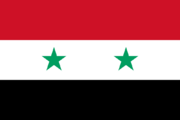Syria Energy Situation
From energypedia
Revision as of 12:10, 9 December 2013 by ***** (***** | *****)
| Syrian Arab Republic | |||
|---|---|---|---|
| Capital | Damascus (33°30′N 36°18′E) | ||
| Official Languages(s) |
Arabic | ||
| Government | Hereditary Dictatorship Presidential single party republic under Emergency Law since 1963. 1973 Constitution defines Syria as a secular socialist state with Islam recognised as majority religion | ||
| President | Bashar al-Assad | ||
| Prime Minister | Muhammad Naji al-Otari | ||
| 'Total Area '( km²) | 185,180 | ||
| Population | 22,457,763 (2011 estimate) | ||
| Rural Population | |||
| GDP (Nominal) | $60.210 billion | ||
| GDP Per Capita | $2,958 | ||
| Currency | Syrian pound (SYP) | ||
| Time Zone | EET (UTC+2) | ||
| Calling Code | +963 | ||
| Electricity Generation | TWh/year (year) | ||
| Access to Electricity | |||
| Wind energy (installed capacity) | MW (year) | ||
| Solar Energy (installed capacity) | MW (year) | ||
Overview
(give a short overview of the country's energy situation, status quo including energy supply and consumption. If this is too much information, split into sub headings)
Energy Sources
Hydropower
Solar Energy
Biomass
Biogas
Wind Energy
Geothermal Energy
Fossil Fuels
Key Problems of the Energy Sector
Policy Framework, Laws and Regulations
General Energy Policy, Energy Strategy
Important Laws and Regulations
Specific Strategies
(Biomass, Renewable Energies, Rural Electrification, Energy Access Strategy, Poverty Reduction Strategy etc.)




















